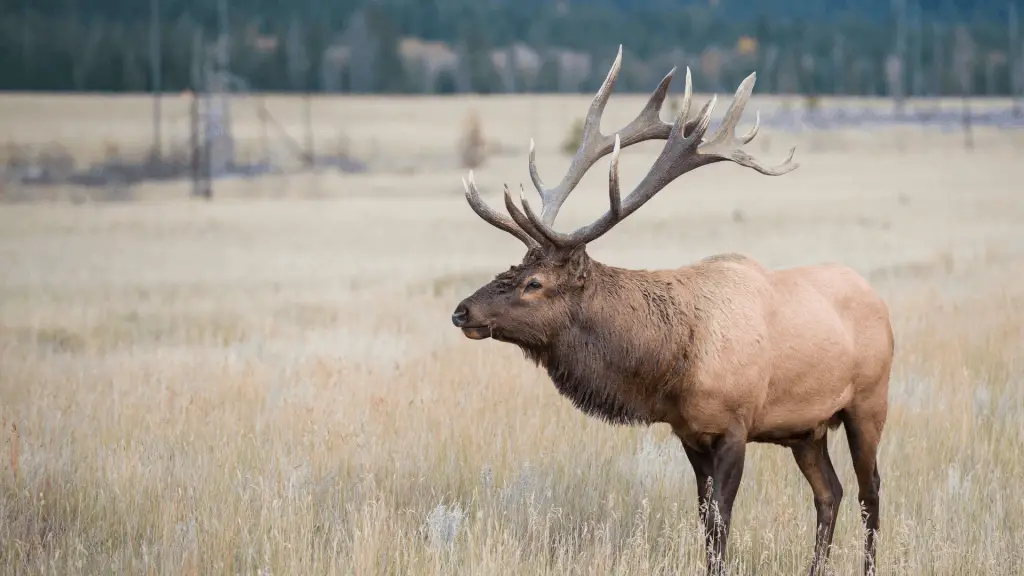Fact checked by Steven Lines, lifelong Hunter and Outdoorsman .
.
Elks are one of the most challenging big game animals to hunt. You will typically find them in mountainous and wooded terrain. They are intelligent and possess highly advanced senses that allow them to detect and get away from danger.
The more prominent of these senses are smell and hearing. If you are a beginner hunter, you probably wonder how far away elk can smell and hear you.
Elk can smell you from 100 yards to a mile on average. They also have excellent hearing and can hear you from 100 yards away. Elk have a good sense of smell. They can detect odors and hear from long distances.
This article will discuss whether elk have a good sense of smell, how far away they can smell you, how good their hearing is and how far they can hear. So stay tuned for all this. It will undoubtedly be an enlightening read for you.

In this post, we'll cover:
Do Elk Have a Good Sense of Smell?
Elk have amazing senses all around, but none compares to their sense of smell. Elk have an exceptionally powerful sense of smell and rely on it heavily. If an Elk smells you, the chances are that he won’t wait for confirmation from his other senses before fleeing.
The part of an Elk’s brain that processes smell is 10,000 more developed than ours . An Elk has a sense of smell estimated to be up to 1000 times that of a human. Let’s put this in context, shall we?
. An Elk has a sense of smell estimated to be up to 1000 times that of a human. Let’s put this in context, shall we?
A human has 5 million olfactory receptors, while an Elk has 300 million . You may have some knowledge of the near-miraculous things dogs can do with their sense of smell. Well, dogs have between 250 and 300 million olfactory receptors. So the sense of smell of Elk is as good as that of a dog.
. You may have some knowledge of the near-miraculous things dogs can do with their sense of smell. Well, dogs have between 250 and 300 million olfactory receptors. So the sense of smell of Elk is as good as that of a dog.
Elks have a longish dark brown snout capped by a large nose. The nose is kept glistening wet by constant licking with their tongue. This keeps the nasal nerves acute and allows for maximum detection of scents.
Elks also have Stereo Olfaction. They get this due to their broader lateral nostrils. This gives them increased directional detection of scents. In essence, this allows them to smell you and know with near certainty in which direction your scent came from.
Seasoned hunters have a saying like this: “You can fool an Elk’s eyes, and you can fool its ears, but you can’t fool its nose.”
How Far Away Can an Elk Smell You?
As we have already established, Elks have an amazing sense of smell. So if you thought you could sneak up on an Elk, you are sorely mistaken.
Various factors determine how far an Elk can smell you. These are wind direction, speed, humidity, temperature, the strength of smell, terrain, elevation, and others.
An elk can smell you from an average of 100 yards to a mile away.
An Elk also relies on its ears and eyes to detect danger. An Elk constantly hears and sees objects moving that may or may not be dangerous to them. But if they catch a whiff of a few scent molecules, they will run immediately.
To this end, there are several things you can do to help you avoid an Elk’s sharp sense of smell:
- Stay downwind– You ought to approach an Elk from downwind; otherwise, they will catch your scent from far away.
- Control your temperature – One important factor to minimize your scent during a hunt is controlling your temperature to prevent sweating. Your hunting clothes should have several layers to shed when it gets too hot.
- Use scent-eliminating spray – It’s impossible to stay clean and not sweat. You should, therefore, keep on hand several bottles of scent-eliminating spray. The product is quite effective at eliminating human odor.
- Stay clean – Cleanliness reduces your human odor. When hunting Elk, you should make sure that you are clean. Take regular showers and change clothes often. Don’t forget to use scent-free soap and detergent.
- Wear scent-trapping clothes – Some clothing brands apply various methods of trapping odor inside the material. They are effective but have the downside of being pretty expensive. They also get uncomfortably warm during exertion.
- Wear camp clothes – Camp activities such as campfires and cooking can produce odors that your hunting clothes will absorb if you have them on. So when you are in camp, change out of your hunting clothes and wear camp clothes.
- Use cover scent – To defeat an Elk’s sense of smell, you can apply a cover scent so that you smell like something other than a human. There are various scents available such as earth, skunk, pine tree, and much more. They come in the form of sprays or wafers. To effectively stalk Elk, apply cover scents directly on hunting clothing. Spraying it in the air will only be effective for a short time.
How Good Is Elk Hearing?
Elk have excellent hearing and can detect even the faintest of sounds. In addition, Elk can distinguish between normal forest sounds and sounds alien to their world. For this reason, it’s important to try and minimize your noise in general.
Also, trying your best to eliminate any uniquely human sound is important.
Most seasoned hunters, however, don’t worry about noise so much. When hunting, Mike Schlegel of Grangeville worries least about elk hearing. He says, “Elk are big critters, and they make a lot of noise, so I don’t worry a lot about noise.”
worries least about elk hearing. He says, “Elk are big critters, and they make a lot of noise, so I don’t worry a lot about noise.”
When he moves and makes noise in a hunting spot, he sometimes throws out a cow call or two so that any Elk that hears him assumes the noise is from another Elk. But this strategy has its limitations, as he points out.
“Even with a cow call, you don’t want to overdo it,” he says.
Elk hear all extraneous noises in their surroundings and subconsciously cancel some of them out. However, the snap of a twig can bring a feeding Elk’s head up immediately to look for the source of the unnatural noise.
Elks have excellent hearing, and if you aren’t a seasoned hunter, you should probably be much more careful not to make noises. If they hear you coming, they will likely flee.
How Far Can Elk Hear
Hunters tend to underestimate an Elk’s hearing abilities. This is no surprise, as not many hunters know Elk’s extremely great hearing senses.
Several factors affect how far an Elk can hear. These include things like the terrain, vegetation cover, the wind, weather, and much more.
On average, Elk can hear from up to 100 yards away. In some cases, they can hear further than this. So it’s important to be extremely quiet when stalking them—some hunters advise ducking into cover when you are 125 yards away.
Here are a few tips to ensure an Elk doesn’t hear you coming:
- Stay downwind – Just like staying downwind will prevent an Elk from smelling you, it will also prevent him from hearing your approach.
- Whisper – The human voice isn’t common in the average Elk environment. If you are using two-way radios with your hunting buddies, keep the radio from blasting while still allowing you to hear and convey your message.
- Use the terrain to your advantage – Use low landscapes such as stream beds or valleys when approaching Elk. This will muffle the sound you make as you move.
- Walk carefully – Walking quietly in the woods is a difficult skill to master. The key is to watch where you step. Avoid sticks, pine cones, gravel, as well as rocks that may roll down a slope. When walking, look around for Elk or other animals. Some animals lurking around may run away and alert the Elk even if you know where your prey is. Dry conditions make quiet walking a challenge. Avoid stepping on pine needles, and don’t climb over deadfall. Step carefully on open ground and use wet clumps of grass to your advantage.
- Eliminate clothing and gear noise – Listen to yourself as you walk. With your hunting clothes and hunting equipment, identify small noises that may be present. These noises are not natural to the wild and will put your prey on alert. These sounds include sloshing water bottles, zipper pulls, dangling accessories, metal-on-metal clanging, fuzzy boots, and more. Avoid these sounds, and all will be well.
Conclusion
When hunting Elk with a bow or firearm, it’s important not to give away your position. Due to their excellent sense of smell and hearing, this calls for extreme care. A spooked Elk can run faster than a horse, clocking up to 45 mph speeds.
So if you scare them away, you will not have a chance at a second crack. Follow the tips in this guide to increase your chances of success!

Steven Lines is a hunter and outdoorsman from Safford, Arizona, USA. Since he was a child, he has been hunting and fishing and has over 20 years of outdoor experience. Steven works as a hunting guide in Arizona during his spare time and runs a Youtube channel dedicated to sharing his outdoor adventures with others.
dedicated to sharing his outdoor adventures with others.
Sources
- https://highplainsdriftinn.com/elk-statistics/

- https://magicvalley.com/outdoors/elk-hunting-tips-defenses-include-broad-vision-uncanny-nose/article_93d3a434-20d3-5e30-867f-dbf2363aef63.html

